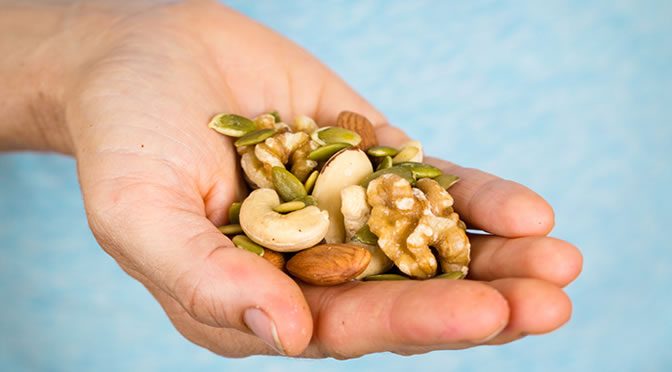Those who eat 20 grams of nuts daily have a smaller chance of developing a wide range of illnesses including infectious diseases, cancers, diabetes and heart disease.
A review of 29 studies on 819,000 people around the world reveals that eating at least 20g of nuts a day can cut the risk of infectious diseases by 75%, lung disease by 52% and diabetes by 40%.
The reports also suggests that 20g daily nut consumption — equivalent to a handful — lowers people’s chance of heart disease by 30% , early death by 22% and the risk of all cancers by 15%.
Dr Dagfinn Aune, study first author, said:
“In nutritional studies, so far much of the research has been on the big killers such as heart diseases, stroke and cancer, but now we’re starting to see data for other diseases.
We found a consistent reduction in risk across many different diseases, which is a strong indication that there is a real underlying relationship between nut consumption and different health outcomes.
It’s quite a substantial effect for such a small amount of food.”
The review included all kind of nuts:
- walnuts,
- hazelnuts,
- almonds,
- cashews,
- pecans,
- pistachios,
- brazil nuts,
- and peanuts.
What makes nuts so favorable is the nutritional value, such as high protein, fibre, healthy fats (polyunsaturated fats), magnesium, potassium, vitamin E and antioxidants.
Consequently, the nutrients in nuts could help prevent cancers while reducing DNA damage, lowering inflammation and help regulation of many processes in the human body.
People who consume nuts every day are less likely to develop heart disease since nuts can lower oxidative stress, reduce cholesterol, decrease blood sugar level and so improve insulin resistance.
Besides that, nuts contain several natural compounds, such as resveratrol, ellagic acid and inositol phosphates, which all have a great influence on health.
Dr Dagfinn Aune said:
“Nuts and peanuts are high in fibre, magnesium, and polyunsaturated fats — nutrients that are beneficial for cutting cardiovascular disease risk and which can reduce cholesterol levels.
Some nuts, particularly walnuts and pecan nuts are also high in antioxidants, which can fight oxidative stress and possibly reduce cancer risk.
Even though nuts are quite high in fat, they are also high in fibre and protein, and there is some evidence that suggests nuts might actually reduce your risk of obesity over time.”
The study was published in the journal BMC Medicine (Aune et al., 2016).
Nuts image from Shutterstock
